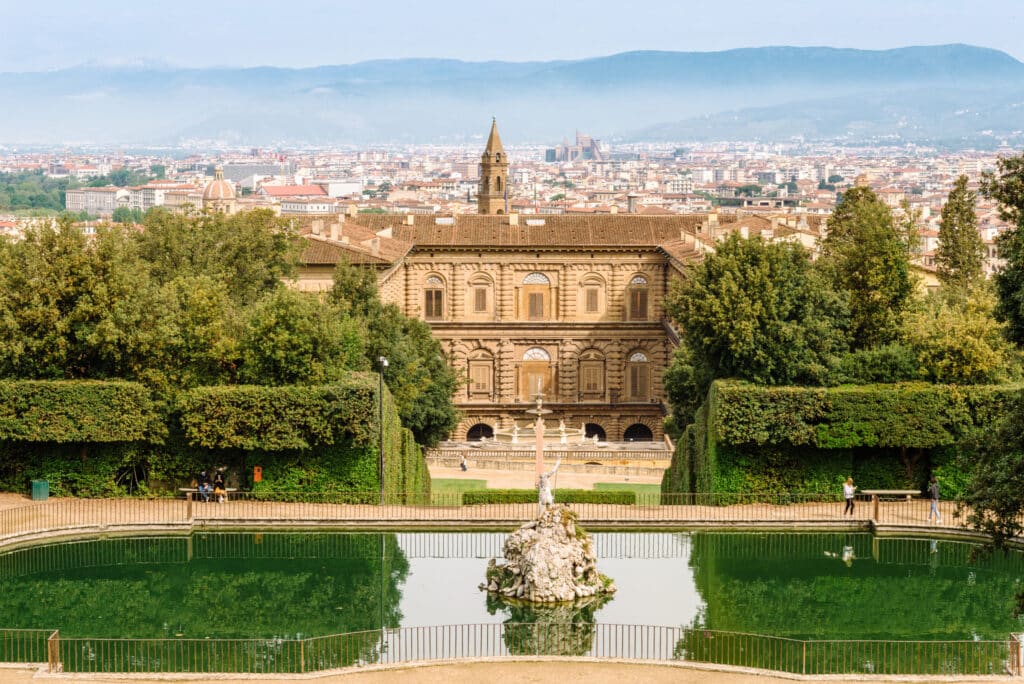
The entrance fee for Pitti Palace, also known as Palazzo Pitti, in Florence, Italy, varies based on factors such as age, nationality, and the type of ticket purchased. A standard adult ticket cost around €16, while reduced prices are available for EU citizens aged 18-25, and free entry is offered to visitors under 18 years old.
The Origins of Pitti Palace
The Pitti Palace, an architectural marvel located in Florence, Italy, has a rich and fascinating history. Once the residence of the powerful Medici family, it now houses an extensive collection of museums showcasing priceless art, artifacts, and treasures. In this article, we will explore the palace’s history, architectural features, and the wealth of knowledge that can be found within its walls.
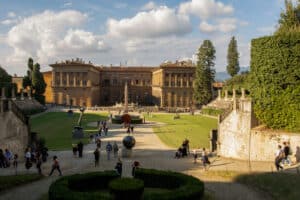
Palazzo Pitti
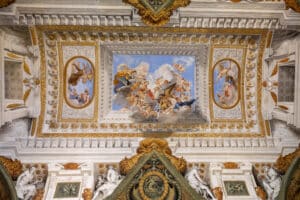
Luca Pitti’s Ambition
The story of the Pitti Palace began in 1458 when the wealthy Florentine banker Luca Pitti set out to build a magnificent palace to rival the Medici family. Although Luca Pitti would not live to see his vision come to fruition, the palace would eventually fall into the hands of the very family he sought to outshine.
A Twist of Fate: The Medici Connection
In 1549, Eleonora di Toledo, the wife of Grand Duke Cosimo I de Medici, purchased the incomplete palace. With the vast resources of the Medici family, the palace was expanded and transformed into the magnificent building we see today.
The Architectural Design of Pitti Palace
The Pitti Palace is characterized by its Romanesque style, often referred to as “all antica” or “in the manner of the ancients.” While the original architect remains unknown, the palace’s design is notably simplistic yet grand. Its rusticated Roman arches, which repeat evenly and systematically across the building’s three layers, demonstrate a deliberate departure from the ornate surface decorations that were popular at the time.
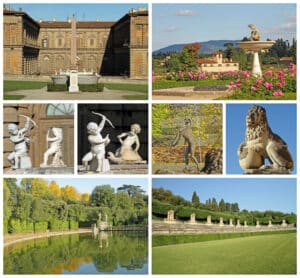
Pitti Palace Entrance Fee
Cosimo I de Medici’s Expansion
Cosimo I de Medici, eager to connect his old palace, the Palazzo Vecchio, to the Palazzo Pitti, commissioned architect Giorgio Vasari to design an elevated, covered walkway between the two buildings. Known as the Vasari Corridor, this one-kilometer-long passageway also led to the construction of the Uffizi, the administrative headquarters of the Medici enterprise.
Under Cosimo I’s rule, the Pitti Palace also saw significant expansion, with a large addition built at the rear of the palace.
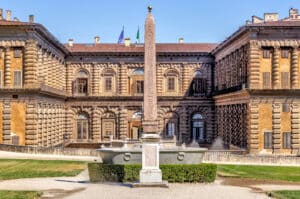
The historic Boboli Gardens and Pitti Palace in Florence Italy
The Boboli Gardens: A Medici Masterpiece
Cosimo I and Eleonora also acquired a vast expanse of land surrounding the palace and entrusted its design to Bartolommeo Ammannati. The resulting Boboli Gardens were a formal, 11-acre garden complex featuring elaborate fountains, gravel paths, a grotto, and sweeping views of Florence. Exclusive to the Medici family, these gardens would influence the design of countless future gardens.
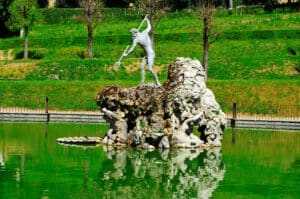
Boboli Gardens in Florence, Italy
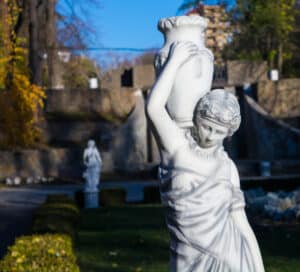
Pitti Palace – Tickets and Tours
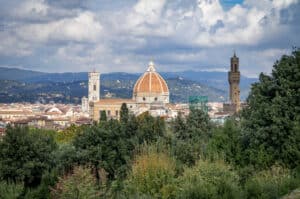
Florence from the Pitti Palace, Florence
A Home for Napoleon and the King of Italy
Following the death of the last Medici male in 1737, the Pitti Palace passed through the hands of several powerful families, including the Savoy and Lorraine dynasties. Napoleon himself used the palace as his residence during his occupation of Italy. In 1919, King Vittorio Emmanuele III gifted the palace to the Italian people, paving the way for its transformation into a museum.
The Museums of Pitti Palace
Today, the Pitti Palace is Florence’s largest museum complex, housing a vast array of galleries and collections.
- Palatine Gallery: The most famous of these is the Palatine Gallery, occupying the piano nobile or main floor of the palace. With over 500 Renaissance paintings on display, it showcases masterpieces from artists such as Raphael, Titian, and Caravaggio.
- Royal Apartments: The Royal Apartments, once the living quarters of the Medici family, now house a collection of their portraits and personal belongings.
- Gallery of Modern Art: The Gallery of Modern Art showcases a diverse range of artwork from the 1800s to the early 1900s, reflecting the evolution of artistic styles and techniques during this period.
- The Silver Museum: The Silver Museum houses an exquisite collection of the Medici’s precious silverware, cameos, and jewelry, offering a glimpse into the opulence and wealth of the family.
- Porcelain Museum: The Porcelain Museum displays an impressive assortment of fine porcelain from various European manufacturers, showcasing the refined taste and artistic sensibilities of the palace’s former occupants.
- Costume Gallery: The Costume Gallery offers a fascinating insight into the history of fashion, featuring garments worn by the Medici family and other European nobility over the centuries.
- Carriage Museum: The Carriage Museum presents a collection of carriages and transport-related artifacts, highlighting the modes of transportation used by the nobility throughout history.
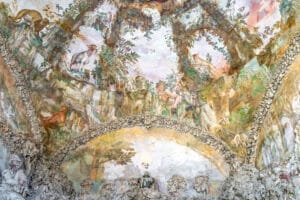
Conclusion
The Pitti Palace, with its captivating history and stunning architectural design, is a testament to the ambition and power of the Medici family. Today, it serves as a treasure trove of art, history, and culture, inviting visitors from around the world to explore its vast and diverse museums. From the breathtaking masterpieces of the Palatine Gallery to the intricate details of the Silver Museum, the Pitti Palace offers an unparalleled journey through time, showcasing the brilliance and legacy of the artists, architects, and patrons who contributed to its creation.

